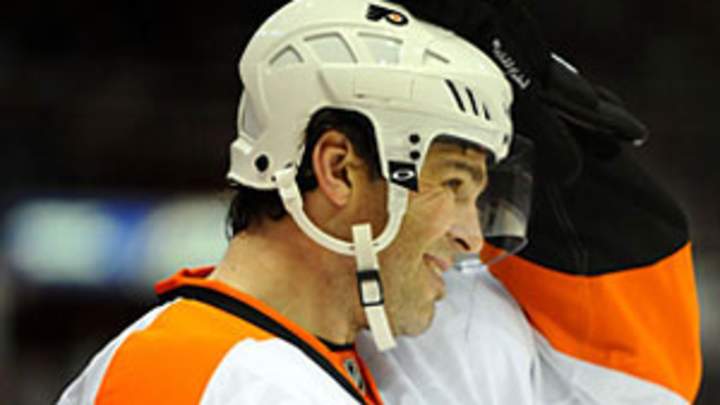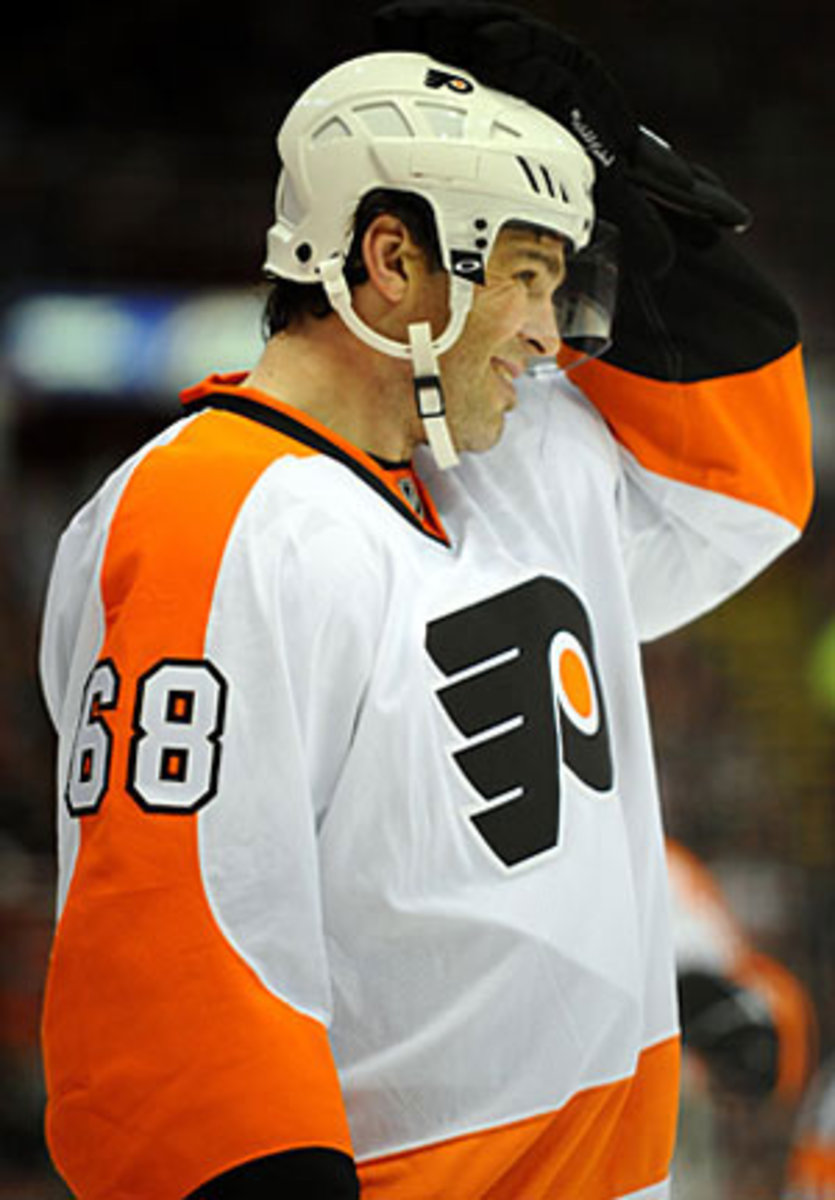Talent vs. time in Jagr's return to the NHL

The classic mullet is long gone, but Jaromir Jagr seems to have some of his once-formidable talent still intact. (Photo by Tim Fuller-US PRESSWIRE)

By Stu Hackel
As the preseason rolls into its second week, the suspensions keep piling up and concussions continue to make news -- Marc Staal won't fly with the Rangers to start their European tour, Sidney Crosby is scrimmaging, and a hearty welcome back to David Perron, who rejoined the Blues Monday to begin training.
Those are all big stories and it's easy to forget the main reason we follow the NHL: the game on the ice. So when the Flyers hosted the Rangers Monday night, we got our first chance to check out Jaromir Jagr, a free agent signing that was the offseason's biggest and most curious story -- at least for a few weeks before things grew darker and sadder.
With a pair of goals and an assist against his most recent former NHL team, Jagr turned back the clock to a time when he dominated the sport. He looked as if he'd never been away.
If there ever was a player who burst onto the NHL scene with more elan than Jagr, we can't think of him at the moment. The young J.J. captured the imagination of the hockey world two decades ago while exuding enormous skill and joy for the game. As frisky as a young colt, he'd blow kisses to the crowd in Pittsburgh after scoring dazzling goals like this one in the '92 Stanley Cup Final against the Blackhawks:
He'd venture onto the ice a couple of hours before the puck dropped and stickhandle around wearing only shorts, shirt and sneakers, just to get the feel of things. He was young and exciting, his boyish face smiled constantly and his thick mane of dark, curly hair flowed out from beneath his helmet as he sailed on the ice. It was hard not to like him.
After two Stanley Cups in his first two seasons, it was thought that, alongside Mario Lemieux, Jagr would help create a Penguins dynasty. They seemed connected, Mario and Jaromir, not just as a continuum of superstar ability but in some mystical way. The scoreboard in the Pittsburgh Civic Arena would flash his name "Jaromir" after one of Jagr's goals, then scramble and reassemble the letters to read "Mario Jr."
The years passed and Jagr's gifts for the game matured, but perhaps the young man himself lagged behind. There were the fast cars and the gambling jaunts, followed by speeding violations and very large debts to casinos. He put up big numbers on the ice -- surpassing 90 points in eight of nine seasons (the exception being the lockout-shortened 1994-95 campaign in which his 70 points in 48 games led the league, good enough to win the first of his five Art Ross Trophies). He was hailed as the best player in the game or, at least, the best offensive player, amid rumors that he was something of a prima donna. All the Stanley Cups that seemed possible never materialized and disenchantment with him grew.
As the new century dawned, Jagr slumped, pouted, squabbled with his coach, fellow Czech Ivan Hlinka, and, reportedly, with his former mentor Lemieux, by then the Pens' owner who had come out of retirement to jumpstart the tottering franchise and hold off a second bankruptcy declaration.
A trade to Washington in 2001 didn't solve anyone's problems and it caused many more for Jagr, caused by the massive $77 million, 7-year deal he signed with Capitals owner Ted Leonsis and the expectations that went along with it. Leonsis' experiment -- building his team, and his attendance, around a superstar -- blew up and Jagr was shipped to the Rangers while Leonsis ate a big portion of Jagr's salary.
Jagr became the toast of Broadway, at least for a while, returning to All-Star status and fulfilling the Rangers' insatiable need to have a marquee player. He helped New York break its franchise record seven-year playoff drought, but the Rangers couldn't win more than one round. By the end of his contract in 2008, Jagr was slumping again, at least by his standards, and being booed by home fans who derided him for what seemed like a lack of effort. No NHL team was going to pay him anything close to what he had made, even after the lockout settlement in 2005 shaved his salary to under $8 million.
To Jagr's great fortune, the KHL was being formed out of the Russian Superleague and looking for star attractions of its own, preferably ones with NHL pedigree. He signed for a reported $35 million for two years, although that figure was a massive exaggeration; the real figure was more like $10 million, and a chance to spend more time at home in Kladno. Still, the young colt who once just loved to play had, in the eyes of some, turned mercenary. He was off to Omsk then and, for all intents and purposes, off the radar of North America's hockey fans, becoming a distant satellite orbiting in some strange galaxy far away.
Periodically, we'd hear of him, especially when he'd say that he wanted to return to the NHL, maybe, some day. "If Mario would call me and say, ‘I'd like you to play for our team,' I would think about it a lot," Jagr told Ken Campbell of The Hockey News in 2009. "I would play for the minimum salary. I would play for $350,000 just for him because I owe him my hockey life. I want to pay him back because he has made me what I am besides my parents."
But, in reality, the money had to be right and the situation had to be right.
Would Jagr return to the Penguins? Would he find a home with the Euro-friendly Red Wings? When he started talking about returning in the spring, they seemed to be likely destinations. No, it was the Flyers -- a landing spot no one had counted on -- who somehow won the auction. They were looking for a new direction, having dispatched two young members of their core: captain Mike Richards and his running buddy Jeff Carter. Along with some typical Flyers toughness the team picked up in its rebuild, Jagr could perhaps supply some skill. He denied that Philadelphia had offered the most money, a claim not everyone bought. Cynics believed that the decision was clinched when Jagr figured out he could drive from the Flyers' Voorhees, New Jersey, practice facility to Atlantic City in well under an hour, especially the way he drives.
So this unlikely marriage is on and just how much Jagr has left at 39 is what everyone wants to see. Can he keep up with the pace of the new, faster NHL? Are his magnificent hands still in good working order? Will he wear down during the long, grueling season?
"There's a lot of people wondering if I can still play and that's fine with me," Jagr said when he came to training camp. "I'm not 21. I'm not trying to prove something with my words. I can promise you one thing … I'm going to give it my best shot to play on a high level. I'm 39 now, but I didn't come here just for one year to impress myself. I'm not saying I'm going to dominate or saying I'm going to play good, but I can promise you I'm going to do all the right things to play."
Flyers GM Paul Holmgren told reporters that he's surprised by how hard Jagr trains and how critical he is of himself: After playing what many thought was a good game last Friday against the Red Wings in his first preseason outing, Jagr said he thought he wasn't very good and had lots to work on. His assist on James van Riemsdyk's game opening goal was said to be a thing of beauty and within a minute, Jagr had scored himself on a play in traffic that seemed like vintage Jags.
He'll have fewer reservations about his second outing, in which he scored twice and set up the game winner. He displayed his heavy shot on his first goal, his terrific release on the second and then stole the puck and screened Henrik Lundqvist on the third.
[vodpod id=Video.15461266&w=425&h=350&fv=gid%3D2011010062%26amp%3Bimg%3Dhttp%3A%2F%2Fwww.nhl.com%2Fvc-thumbnails%2F20112012%2F01%2F0062%2F640x360%2F1_62_nyr_phi_1112_h_continuous_800K_16x9_1.jpg%26amp%3Bserver%3Dhttp%3A%2F%2Fvideo.nhl.com%2Fvideocenter%2F]
Yes, it is odd to see him wearing Flyers orange and white. It's odd to see him back in the NHL. But more games like this will erase the strangeness pretty quickly. Pretty good for an old man.
